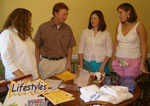Health care students have
‘eye-opening’
time in Abbeville
by Henry
E. GreenOf The Press and Banner and Abbeville Medium
Health care students spending time in Abbeville are learning differences in urban and rural medicine.
They all are working in a program called SCRIPT, which stands for South Carolina Rural Interdisciplinary Program of Training, according to a description provided by Elizabeth Hunter, one of four students in the project.
The program is sponsored by Lowcountry AHEC in collaboration with Mid Carolina, Pee Dee, and Upstate Area Health Education Consortia.
“Through intensive immersion in a rural community, health profession students will practice in their own clinical specialty in a rural, interdisciplinary environment and participate in an organized, community focused health care activity,” she said.
 Health care
students spending time in Abbeville are learning differences in urban
and rural medicine. Students Adrienne Sanders, Tony Broering, Erin
Hollifield, and Elizabeth Hunter are at the Abbeville Senior Center
providing health education tips to seniors.
Health care
students spending time in Abbeville are learning differences in urban
and rural medicine. Students Adrienne Sanders, Tony Broering, Erin
Hollifield, and Elizabeth Hunter are at the Abbeville Senior Center
providing health education tips to seniors.In addition to Hunter, the students include Adrienne Sanders, Tony Broering, and Erin Hollifield.
Students are introduced to characteristics of community focused care and the context of care (interdisciplinary, rural, transcultural) through experiential teaching strategies (clinical practice, field work, problem-based learning) and continuous improvement methods.
Health professions represented include health administration, medicine, pharmacy, nursing and speech therapy.
Hunter said Friday that she is working in health administration at Abbeville County Memorial Hospital.
Sanders is working at Savitz Drug in the pharmacy department, Broering is working in Iva at a doctor's office, and Hollifield is working as a nurse at the Abbeville County Health Department.
Hunter said that she and her comrades are working in Abbeville for five weeks—she noted all but Hollifield are from Greenville and go to the Medical University of South Carolina.
Hollifield, who attends Clemson University, is from Hampton.
The students, who are nearing the completion of their time in Abbeville, are paid a stipend for their internships.
While in Abbeville, they are all living in a house on Vienna Street—the house is leased to AHEC.
Hunter said that the concept of providing medical students with internships in rural areas in South Carolina began in the Lowcountry, and the idea spread to the Upstate.
“It’s been an awesome experience,” said Hunter. “Very eye-opening.”
She noted that all of the students except Hollifield are from urban areas, and did not know much about medicine in rural areas before coming to Abbeville.
And to be sure, indicated Hunter, there are differences in rural and urban health problems and the way medicine is practiced.
Diabetes, for example, is very prevalent in Abbeville, she said. There appears to be a higher incidence of the disease here than in urban areas.
Much of this is due to obesity, said Hunter, who noted that there are many overweight people in Abbeville, and obesity is a contributing factor to diabetes.
“Working in a rural community has its benefits,” she added, noting that it has a more intimate atmosphere due to its small size.
The four paid a visit to the Abbeville Senior Center Thursday—at the Senior Center, the objective was to raise awareness and educate seniors about issues pertaining to the health of the elderly and their well being.
Two activities were planned—nutritional bingo, a bingo game to educate senior citizens about healthy nutrition choices they can make.
The seniors were also shown how to fill out forms concerning current medication in case of emergency.
The forms could be used in the event of say, going to the emergency room or to the regular doctor’s office.
Having the medications listed on a form saves the physician time in asking the patient what medications he is currently taking—the patient might not even be conscious enough to supply the answers.
It also lessens the probability of error of administering the wrong medication.
The form can be kept in a small “plastic sleeve that is about the size of a credit card,” she said.
The students thanked Abbeville County Memorial Hospital, Bi-Lo and the Belmont Inn for providing prizes and materials for the Senior Center gathering.
Editor's note: The article ran in the June 22 issues of The Press and Banner and Abbeville Medium and is reprinted with permission.
Friday, July 15, 2005
Catalyst Online is published weekly,
updated
as needed and improved from time to time by the MUSC Office of Public
Relations
for the faculty, employees and students of the Medical University of
South
Carolina. Catalyst Online editor, Kim Draughn, can be reached at
792-4107
or by email, catalyst@musc.edu. Editorial copy can be submitted to
Catalyst
Online and to The Catalyst in print by fax, 792-6723, or by email to
petersnd@musc.edu
or catalyst@musc.edu. To place an ad in The Catalyst hardcopy, call
Community
Press at 849-1778.